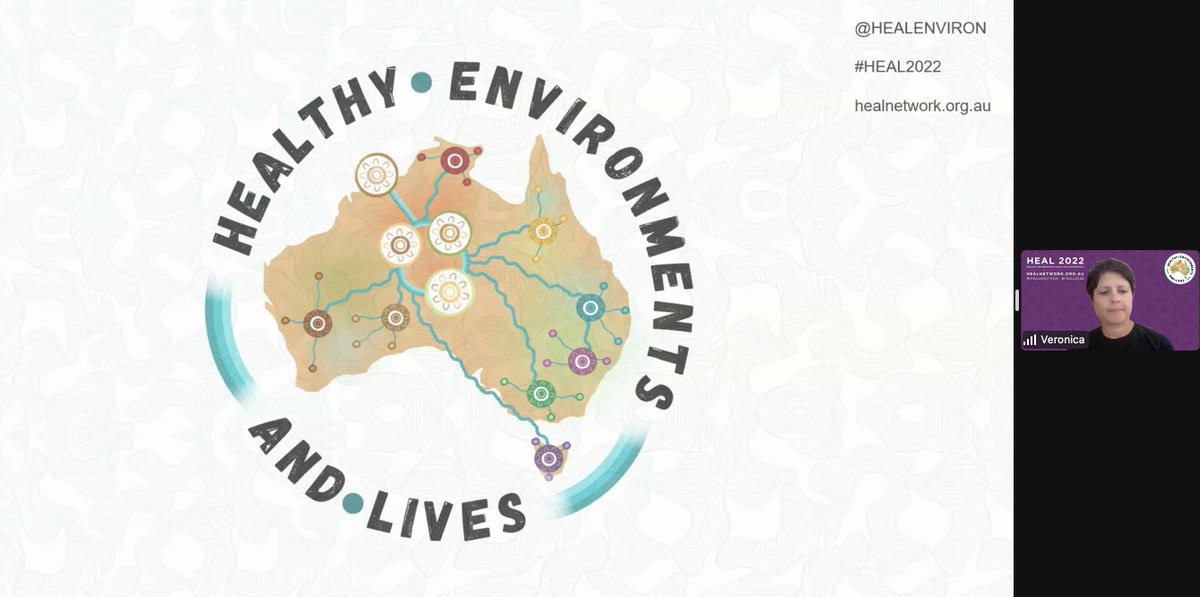
#HEAL2022 has resumed now, with participants splitting into thematic sessions: I (@mariemcinerney) will be in Aboriginal & Torres Strait Islander knowledges and food/soil/water security: @AlisonSBarrett will be at clean energy and bushfires sessions 

Assoc Prof Linda Payi Ford opens with the importance of Indigenous voices being heard in climate action and #HEAL2022 discussions 

Hearing from Prof Elaine Lawurrpa Maypilama & Assoc Prof Petra Buergelt re this project #HEAL2022 

Sees Indigenous knowledges as critical to survival, not just of Aboriginal and Torres Strait Islander people but all humanity #HEAL2022 

Strong culture, strong language, strong identity: says Elaine Lawurrpa Maypilama #HEAL2022 

The more we are getting to know, the more we in awe of the sophistication, tremendous value of Indigenous knowledges, says A/P Buergelt of Yolngu research #HEAL2022 

Project has looked at what made Yolngu stronger, and what makes Yolngu weaker. Latter points to Balanda (non-Indigenous people) research impact #HEAL2022 

Pathways to strengthening Yolngu, includes strengthening (already strong) Yolngu governance. #HEAL2022 

Now hearing from Kris Vine re Healing Country project, local community led actions aimed at addressing disproportionate impact of climate change on Aboriginal and Torres Strait Islander people #HEAL2022 

Shout out to the work from @DrVMatthews and others in @LowitjaInstitut Discussion Paper: lowitja.org.au/page/services/… #HEAL2022 

Goal of Healing Country project to co-design, implement adaptation strategies, v much focused on local solutions #HEAL2022 

Real focus on ensuring strong Indigenous cultural and intellectual property rights in the project.
Community workshops have begun.
Continue to establish cultural governance groups. Will be engaging with community/service stakeholders.
#HEAL2022
Community workshops have begun.
Continue to establish cultural governance groups. Will be engaging with community/service stakeholders.
#HEAL2022
Ongoing evaluation will be embedded: #HEAL2022 

Scoping review also underway, testing what's already out there #HEAL2022 

Now hearing from Amba-Rose Atkinson, Gumbaynggirr nyami from the mid-north coast of New South Wales (who has written for @CroakeyNews from #COP27 eg croakey.org/at-cop27-and-b…) #HEAL2022
"Doing this research because I have responsibility to take care of Country: I'm the manifestation of my ancestors". Climate change compounding the disparities caused by colonisation." Amba-Rose Atkinson 

Big takeway from #COP27 was the need to "protect our knowledge holders", a key part of that is in language which "brings Country to life". Relationality is integral to methodology: Amba-Rose Atkinson #HEAL2022
Significance of research: identity tied to Country, destroying this link damages health and wellbeing. Amba-Rose Atkinson sees climate change as a symptom of colonisation, says important to define what 'climate justice' refers to, where Indigenous voices are there. #HEAL2022
Now hearing from Djarra Delaney, Quandamooka - his PhD at Melbourne Uni School of Geog, is investigating climate adaptation practices in Australian Indigenous island communities in context of colonisation/climate change #HEAL2022 

Welcome recognition on Masig island in the Torres Strait of non-colonised weather/seasons -- Djarra Delaney says knowledges also to be found in Indigenous art, other methods of recording #HEALTH2022 

#HEAL2022 Djarra Delaney presentation 

Adaptation discussions too often 'top-down' - within community, because of gaps, adaptation occurs at a local level, but beware of colonial co-opting: Djarra Delaney #HEAL2022 

Comment in the chat box, echoes praise from Assoc Prof Linda Payi Ford at cultural safety on show in research projects outlined here at #HEAL2022 session 

Linda Payi Ford closes theme session, praising Amba-Rose and Djarra for how they both draw from oral histories and lived experience in the way they interpret the world, urges them to share videos to other young people on Tic Toc, "to see and hear your voices". #HEAL2022
New session now opens on: Food, soil and water security, being led by Professor Erica Donner (UniSA) #HEAL2022: 

Donner: Means we need to take a One Health approach: holistic view that is very close to the wisdom of Indigenous knowledge systems, which is why Indigenous leadership so important to @HealingWorksAu #HEAL2022 

There is human right to water and sanitation, Aust is a signatory to the SDGs. UNDRIP also acknowledges right to water, sanitation health for Indigenous peoples. #HEAL2022
1100 remote communities in Australia, huge diversity. But v often tap water not safe to drink: report last week that more than 500 communities did not have water that was safe to drink/regularly tested: more here #HEAL2022 theconversation.com/countless-repo…
What are the issues? #HEAL2022 

And the growing risks #HEAL2022 

Water has to be: "fit for people, purpose and place" - tech not the only solution, local solutions critical, incl workforce, skills, infrastructure: Lansbury #HEAL2022 

Some effective local responses #HEAL2022 

Cultural, racial and financial issues in play on water security/access, with huge impacts for health: Lansbury #HEAL2022 

Now hearing from Prof Anne Roiko (@Griffith_Uni) - talks re the amazing twisted and torn tree in her slide, what it says about resilience, strength and long-term thinking #HEAL2022 

Roiko talking about the need to do research differently so it can handle the complexity of climate change ("biotic impoverishment"): water transcends boundaries, disciplines but are disconnected systems of monitoring/surveillance #HEAL2022 

The big questions of #HEAL2022 

Hearing how 70 pc of emerging infectious diseases have animal origins now, from Prof Aparna Lai
Water an important pathway for zoonotic spillover, raising many questions (most literature focused on vector borne diseases), incl risk from climate change, other gaps.
#HEAL2022
Water an important pathway for zoonotic spillover, raising many questions (most literature focused on vector borne diseases), incl risk from climate change, other gaps.
#HEAL2022

Creation of Australian CDC presents timely opportunity to link animal-human-environment systems together to: we gather a lot of data that not integrated - Lal #HEAL2022 

The serious impact of climate change on contamination to be seen in Sydney (2019) where air pollution from smoke events assoc with 5pc of non-accidentally mortality: Prof Nanthi Bolan @uwanews #HEAL2022 

Contamination/Climate change: Bolan #HEAL2022 

Need for more political and social scientists to be involved in discussions/work on impact of climate change on health, and solutions/mitigations etc, being discussed at equity session being chaired by @SharonFrielOz #HEAL2022
• • •
Missing some Tweet in this thread? You can try to
force a refresh





















